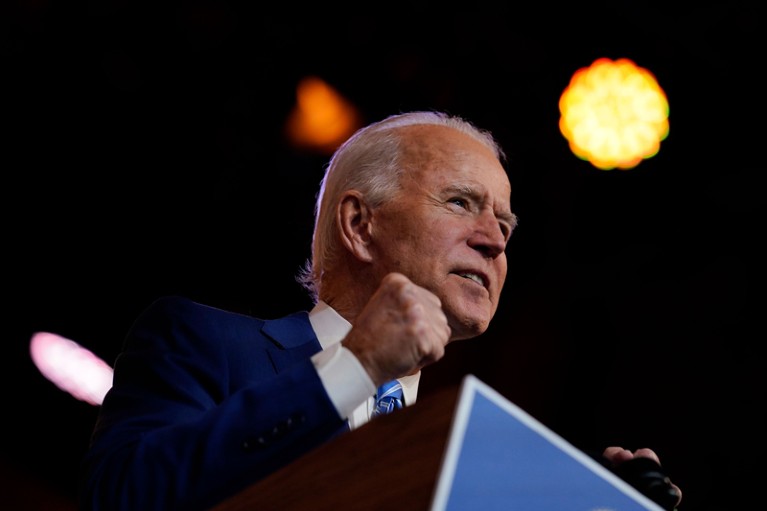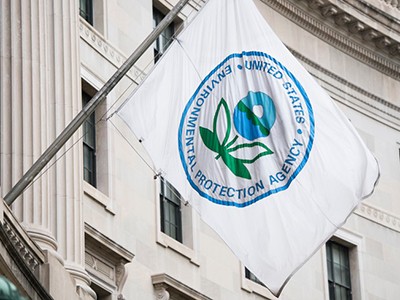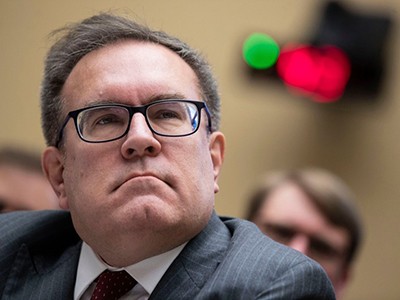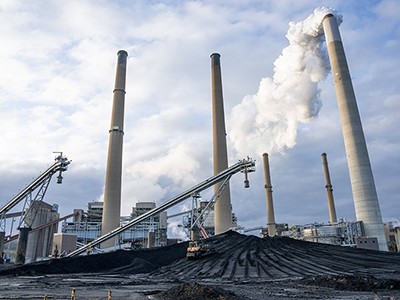
Biden needs to oversee efforts to strengthen the EPA. The durability of his commitments to protect public health and the environment depend on it.Credit: Carolyn Kaster/AP/Shutterstock
When former US president Richard Nixon proposed establishing the Environmental Protection Agency (EPA) in 1970, he spoke of the need to preserve Earth as a place that is both habitable by — and hospitable to — people. Nixon, a Republican, acknowledged his own fear of creating a new federal bureaucracy. But the task of rescuing the natural environment, he argued, required a strong, independent agency that would be able to marshal “a coordinated attack on the pollutants which debase the air we breathe, the water we drink, and the land that grows our food”.
The EPA’s successes are undeniable. Over the past 4 decades, US emissions of the most common pollutants, as measured by weight, have fallen by 71%, even as the country’s population grew by some 105 million people and the size of its economy nearly tripled. Most emissions from the average automobile have fallen by 98–99% over the same period, to take just one industrial sector. Petrol is cleaner — and free of toxic lead. City sewage and industrial waste no longer flow unchecked into waterways, and rivers no longer catch fire as a result of discharged oil waste. And, internationally, the EPA’s science and regulatory standards have helped other countries to protect their environments, too.
But on President Donald Trump’s watch, regulatory standards have been weakened, research teams slashed and independent scientific advice relentlessly assaulted. Four years on, the outgoing administration has not just dismantled environmental and public-health protections, but also systematically undermined the EPA’s scientific and regulatory foundations — invariably in favour of the industries that the agency regulates. Incoming president Joe Biden and his vice-president, Kamala Harris, have a considerable restoration task ahead of them.
Can Joe Biden rebuild the ravaged US Environmental Protection Agency?
Although Trump swung the axe, the EPA’s destruction was a long time in the making. Its fiercest critics have sought to cut the agency back for years, arguing that the nation’s air and water are already cleaner than they have been in decades and that stronger regulations come at the expense of jobs and economic growth.
Biden’s campaign pledges suggest that he and his team have every intention of working to restore and strengthen rules and regulations, and to rebuild the EPA’s in-house science teams. But the incoming administration must think seriously about structural reforms. In addition to the need for past damage to be repaired, the agency must be strengthened in a way that makes it harder for any future administration to even think about strangling the structures of evidence that are essential to good policy. This will not be easy, but the following actions will help.
An EPA administrator will soon be nominated. Once in the post, they must make it an urgent priority to nominate an assistant administrator for the EPA’s research division, the Office of Research and Development (ORD). This position has not been filled for eight years. Senate Republicans refused to confirm former president Barack Obama’s last nominee, and the EPA leadership appointed by Trump never nominated anybody.
The sustained undermining of science by the EPA’s leaders is a travesty
Scientists at ORD conduct the core scientific assessments and research that feed into the agency’s regulatory decisions. It’s important that the ORD chief sits at the top table so that the division — and science more broadly — has a voice alongside the regulatory and political interests that the EPA administrator has to work with. The new EPA administrator should also consider bringing in a separate chief scientist who can represent science across the entire agency.
Another notable EPA role is that of the scientific-integrity official, whose job is to ensure that the agency’s career scientists and political appointees alike abide by the agency’s scientific code of conduct. This role needs to be upgraded to a more senior position that reports directly to the administrator and is situated alongside the EPA’s inspector-general, who has broad authority to investigate malfeasance, such as allegations of corruption or conflicts of interest, at the agency.
Staff incentive structures should also be reviewed. The aim of such structures must always be to prioritize independence and honesty over efficiency or obedience. At an agency whose primary purpose is to protect human life, the leadership must be told the truth, not what it wants to hear.
Five ways that Trump is undermining environmental protections under the cover of coronavirus
Under the incoming administration, the White House Office of Science and Technology Policy is expected to reprise its former role as coordinator and connector of science across federal agencies. As part of that mission, it should explore the idea of appointing someone to oversee scientific-integrity rules across federal agencies, and to provide relevant support when needed.
There are also things that Congress can do to better insulate the EPA from political interference, including codifying scientific-integrity policies at the EPA and other agencies through legislation. Democrats have already introduced a bill with this aim. Giving scientific-integrity policies the force of law would raise the stakes for future administrations, and make it illegal for leaders to disobey such policies.
But Biden’s first step must be to appoint an EPA administrator who understands how government works and has the vision and steel to carry out his aggressive environmental agenda. They must lead with the purpose of securing the EPA’s mission and independence in perpetuity, not just over the next four years.
Success here will also require a role for the incoming president. One of the greatest challenges all presidents face is choosing which actions to delegate, to whom, and to what extent. Biden will need to take personal charge of the pandemic response, but he must also make strengthening the EPA a priority, not least because the viability — and durability — of his commitments to protect public health and the environment depend on it.
The need to take these steps, aimed at strengthening science and scientific integrity at the EPA, was brought into sharp focus by the actions of the Trump administration, which exposed a deep flaw in the agency’s current system: policies relating to integrity were designed with the assumption that the EPA leadership would guard and enforce them. Under Trump, leaders used the power of their offices to turn the clock back on important environmental and public-health regulations. The EPA has lived through the most dangerous period of its 50-year history — Biden’s administration has the chance to ensure that the agency is never put in the same position again.

 Can Joe Biden rebuild the ravaged US Environmental Protection Agency?
Can Joe Biden rebuild the ravaged US Environmental Protection Agency?
 The sustained undermining of science by the EPA’s leaders is a travesty
The sustained undermining of science by the EPA’s leaders is a travesty
 Five ways that Trump is undermining environmental protections under the cover of coronavirus
Five ways that Trump is undermining environmental protections under the cover of coronavirus
 Science under siege: behind the scenes at Trump’s troubled environment agency
Science under siege: behind the scenes at Trump’s troubled environment agency
 What a Joe Biden presidency would mean for five key science issues
What a Joe Biden presidency would mean for five key science issues






